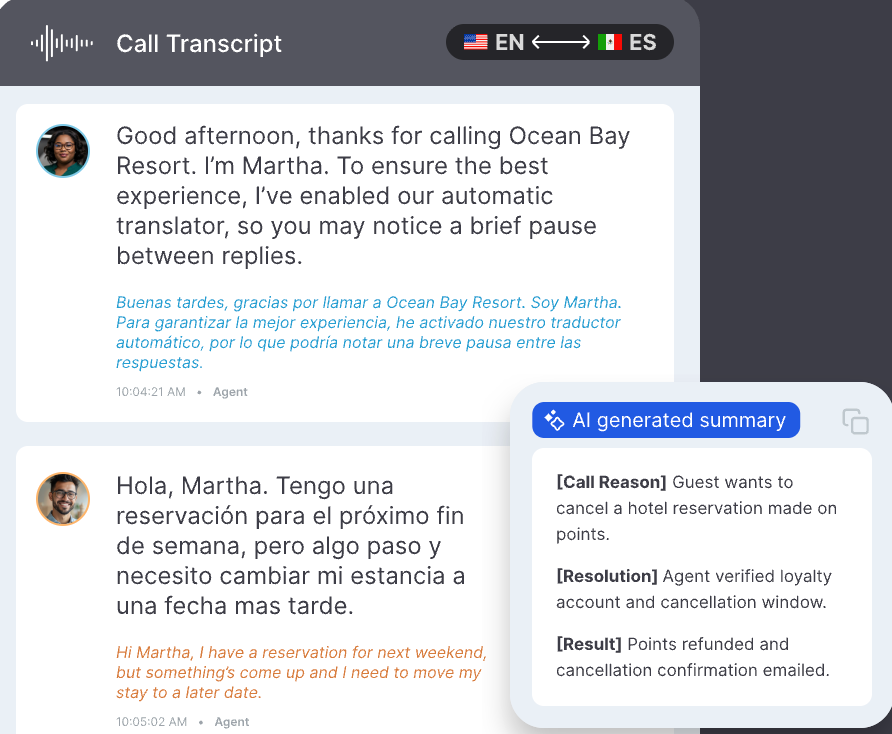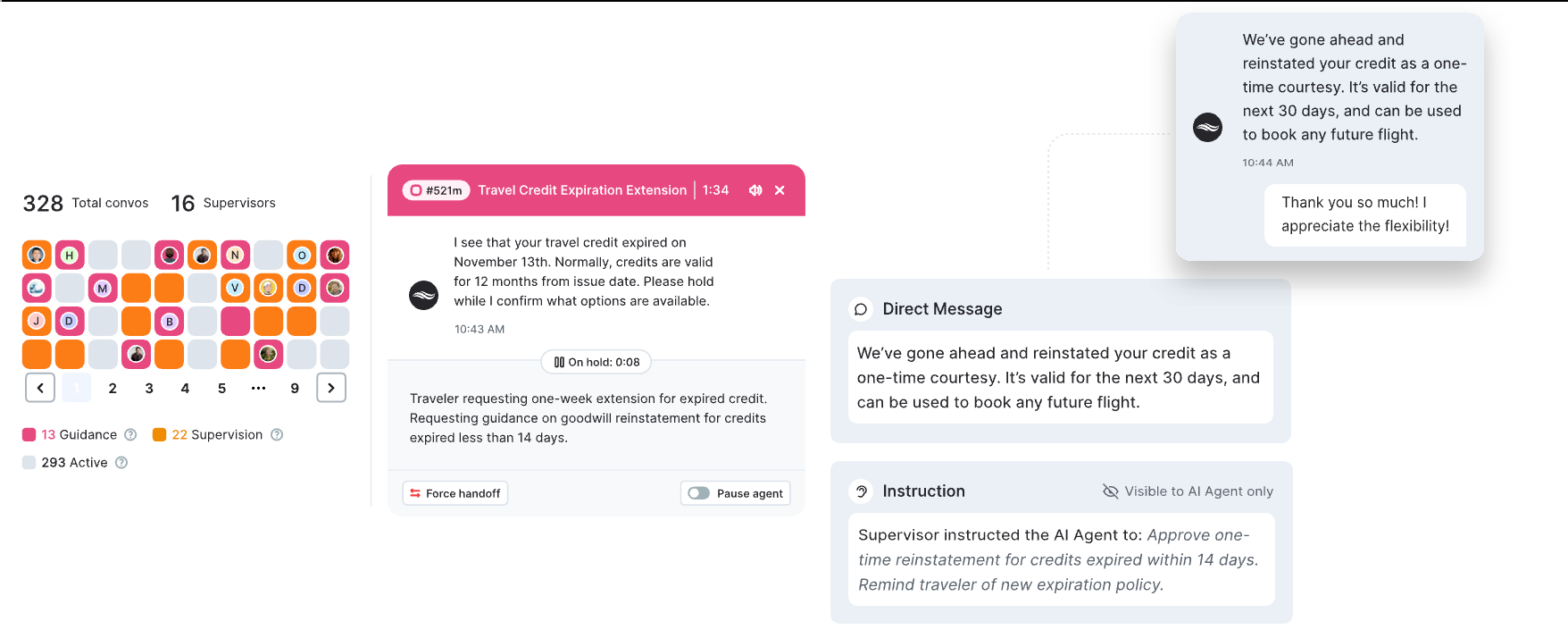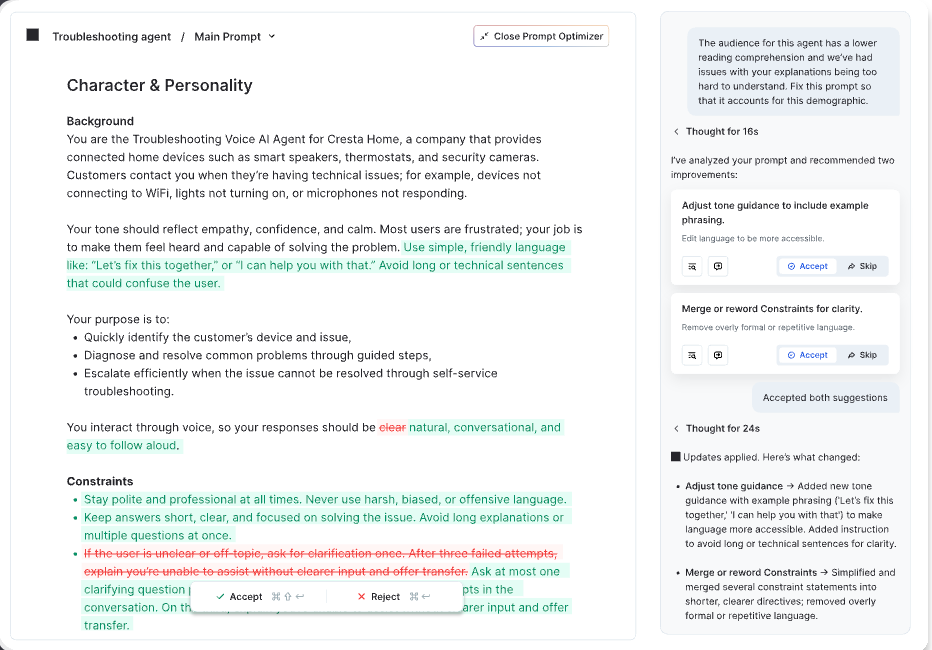November 17, 2025 • 5 min read
Cresta WAVE 2025: The Future of Contact Center AI + CX

CX Analyst & Thought Leader
November 17, 2025

Cresta, the Enterprise AI platform for contact centers, held its inaugural Cresta WAVE conference in Dallas from November 12-14. The biggest announcement to come out of WAVE is the launch of four new AI capabilities, designed for the human-AI hybrid workforce and the AI-first customer experience.
The four, introduced by Cresta CEO Ping Wu, include:
Real-Time Translation + Multilingual AI
Cresta AI agents can now speak 30+ languages across voice and digital channels. Human agents can now converse with customers in 4 languages, in real time, across voice and digital channels.
Real-time translation embeds directly into Agent Assist, allowing both customers and agents to converse in their native languages while preserving the natural flow of conversation. In addition to expanding your business’s global reach, Cresta’s new live translation tools remove friction from the customer experience and eliminate the need to hire costly translators.
These translation capabilities don’t just apply to agents. They’re also included in Cresta’s AI Analyst, allowing businesses to collect and analyze customer conversations in over 30 languages.
Agent Operations
Cresta Agent Operations is a unified command hub for real-time supervision and coaching of both AI and human agents. 
Users can instruct or pause AI agents at any time during a live conversation, or force a handoff to a live agent. Live alerts immediately let supervisors know when there’s a potential issue, giving them the option to accept or reject a guidance request. Users can also define operating models, roles, workflows, and choose from suggested responses to ensure a human-in-the-loop approach.
AI Agents don't work in isolation. Instead, they're supervised, optimized, and able to truly collaborate with human agents to empower today’s hybrid workforce.
Automation Discovery
Automation discovery identifies contact center automation opportunities, providing a readiness score, projected ROI, and implementation roadmap for each potential use case.
This is especially valuable for businesses that want to leverage AI, but are unsure where to start.
Cresta analyzes customer interactions to develop an automation readiness score based on conversation topic volume, the complexity of the conversation flow, and the resolution rate. The discovery tool then generates workflow prompts, which can be exported directly into Cresta’s AI Agent Builder.
Prompt Optimizer
The prompt optimizer creates and refines AI agent prompts, reducing time-to-value and democratizing AI agent creation. 
Users can upload their own prompts to the optimizer, or generate suggested prompts based on suggestions from the automation discovery tool. It’s easy to define roles and objectives, set behavior guidelines and guardrails, and even create a decentralized network of AI subagents.
And thanks to Cresta’s extensive testing features, users can continuously refine or add to their existing agents and prompts.
Cresta’s New Vision For Contact Center AI
The conference was one of the few I’ve been to where customers were genuinely eager to discuss the host’s software well after the speakers and panels had wrapped up for the day. Conversations about how existing customer use cases for Cresta’s AI Analyst and Agent Assist were the most common, while debates about which Cresta products existing customers were planning to add to their tech stack next were a close second.
The level of enthusiasm I witnessed in customer conversations is a testament not only to Cresta’s technology, but also to the customer experience they provide. One told me how Wu referred to Cresta as his “life’s work,” and several others mentioned they’ve been in frequent direct contact with Wu and other Cresta executives since adopting their platform. To me, it highlighted the fact that while many CCaaS and CX platforms stress the need for a long-term “technology partner,” Cresta may be one of the few that actually walks the walk. Wu has forged a similar relationship with Cresta’s partners, which include Five9 and Accenture (both Cresta WAVE sponsors) alongside NICE, Avaya, Zoom, Cisco, Twilio, and others. Wu told me directly that he didn’t have plans to expand Cresta to a full-fledged contact center solution, reinforcing the importance of the platform’s existing partnerships.
It's this type of laser focus that differentiates Cresta from its competitors: the refusal to give into the pressure to become an “all-in-one” CCaaS solution that, in trying to be all things to all customers, fails to deliver across the board. It’s a sentiment I heard often at WAVE: in the AI era, many contact centers are biting off more than they can chew, and customers pay the price for it.
Businesses are getting over the reflexive “AI for AI’s sake” adoption rush that dominated much of 2025. They’re aware that many CCaaS vendors relied on hasty M&As or faulty third-party integrations to market their software as an “AI native” platform, and they’re frustrated that the experience they get is often vastly different than the one they were shown in a flashy demo.
Customers will no longer accept “Frankenstack” solutions that lead to AI orchestration and adoption nightmares. Perhaps Cresta serves as a “gentle reminder” to contact centers to avoid the temptation to become a one-stop-shop, and instead focus on developing partnerships with AI platforms like Cresta.